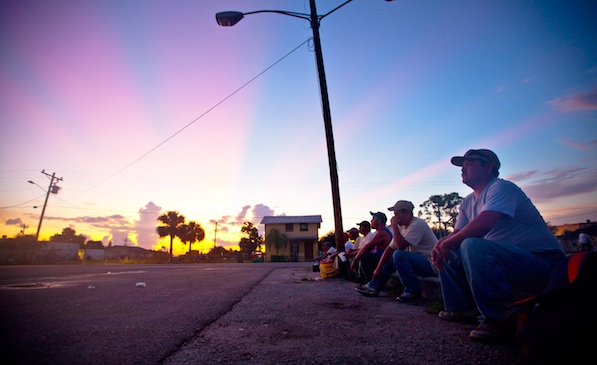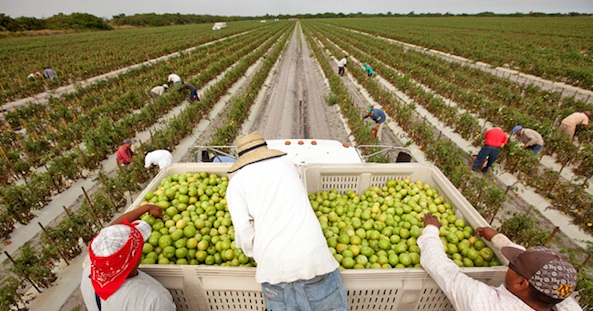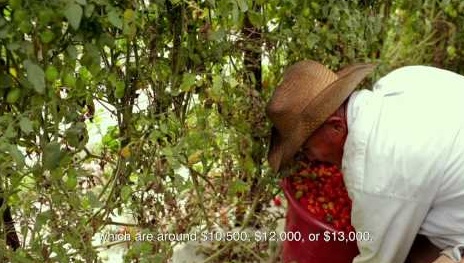
The relationship between food and social justice has been in the spotlight for a while now, fueling heated discussions about GMO ethics and consequences and the commercialization and industrialization of the food production process–not to mention related subjects like ecology, carbon dioxide emission, consumer health, animal cruelty and ingredient awareness.
Food Chains is the latest documentary to encourage the viewer reflect on the plate he or she is served, but it expands well beyond the dinner table, focusing instead on generations of farmworkers who are abused and exploited by the agricultural industry. The need for a revolution has never been more apparent.
With the support of actress-activist Eva Longoria and author-investigative journalist Eric Schlosser (Fast Food Nation), director Sanjay Rawal looks at the Coalition of Immokalee Workers, a group that’s fighting to fix this very important link of the food chain. We met with Schlosser (executive producer) and Smriti Keshari (producer) in Berlin, where the film had its European premiere, to shed light on those complex issues–and look at them from a more universal perspective.
Anna Tatarska: Were you planning on making the film even before the 2012 fight between the tomato laborers from Coalition of Immokalee Workers and grocery store Publix, which resulted in a six-day fast? Or was that a coincidence that happened during filming?
Smriti Keshari: The film started off with the director, Sanjay Rawal. His background is in agriculture, or rather his parents’ background. He had attended conferences on agriculture in Florida and California. But about three years ago, he realized that all the attention he had [given to] food had been around the taste, and how it affects our bodies. There’s not so much thought given beyond that, [such as who are] the people who pick our food, and what are their lives and conditions like? I think that’s a mentality a lot of consumers have. So the film started by trying to understand who are the people beyond: Who are the farmworkers, how are they treated, how does this whole infrastructure of distributors, supermarkets and farmers work? At the same time we met up with Eric [Schlosser]. We read Barry Estabrook’s book Tomatoland and it really inspired [us]. We set off to find the stories of farmworkers going to the fields, to speak with them and to link up with organizations that were working on supporting them.
Eric Schlosser: And I think they did an enormous amount of first-hand research for this, visiting the fields not only in Florida but throughout California. There were a great many issues to deal with in this film. And it was in the editing process, one rough cut after another, that the structure emerged, using the hunger strike as a kind of narrative throughout. These sorts of films [that deal with big social issues] are very difficult to structure. With Food, Inc., the director, Robbie Kenner, spent an enormous amount of time [editing] after he had shot an incredible amount of footage and there was so much that didn’t make it into the film. The Coalition of Immokalee Workers really seemed like the right focus, but then using the hunger strike … it took a while to establish it as a narrative thread.
Tatarska: It frames the film perfectly, since you have an event that lasts the whole duration. It gives it a sort of a chapter structure.
Schlosser: Here’s the beginning, the middle and the end, which is pretty nice. Did you see Food, Inc.? It doesn’t have that. And my book Fast Food Nation also doesn’t have a narrative structure. It’s very complicated to do without an event like that. It wasn’t clear in the beginning, when Sanjay and Smriti were putting this thing together. Then they found it and I think it does work really well.
Tatarska: Food Chains and Food, Inc. both focus on how food is produced before it lands on our plates, but from different perspectives. I find it amusing how attached Americans are to this picturesque image of a farm that delivers their dairy, meat and vegetables; they don’t want to acknowledge what the process really looks like. Why do you think that is?
Keshari: Well I think that there is definitely this image of a farm, of this picturesque red barn, and people don’t think of supermarkets … I mean they look at supermarkets as neighborhood institutions, not massive corporations. And I think it’s because when that consolidation of supermarkets happened, before there were so many different brands, there was a more healthy balance of buying and purchasing. But once there was a consolidation of supermarkets and just a few bigger names emerged, they ended up with all the buying power and they dictated all the prices. They have control over how everyone is treated. But no one knows that! There are no marketing campaigns to understand how your supermarket works. And that’s one of the aims of the film. We really stumbled upon that thanks to the Coalition; they are the ones who who have [studied] this power structure and [have gone] to the top food buyers and having conversations with them.
Schlosser: Americans are just so alienated from the rural life. They’re so distant from it. It was only 100 years ago when each of us had a relative that lived on a farm and most Americans would visit this farm. Now probably fewer than one million, maybe a million and a half people are working as farmers on the land, out of more than 300 million. So peoples’ awareness of what’s happening in agriculture is coming from the mass media. And the mass media is portraying all those ridiculous images that have nothing to do with reality, and it’s a constant task to get people to see that reality and confront it. So you’ve seen all those documentaries about food. How often do they deal with farmworkers and the labor related issues?

Tatarska: I don’t think I have seen anything else that focused particularly on that issue. However, I feel like films that talk about the transformation of agriculture in a certain sense always touch upon the subject. For example, when they talk about how the food production system has changed since the 1970s–it was a decision that’s influenced the current situation of farm workers immensely.
Schlosser: But it’s usually the farmer, not the farmworker. In Food, Inc. we had a section on meatpacking workers, and we really wanted to do the farmworker, too. But there was just so much that had to be in that film [that] it was hard enough having done a meatpacking section. Then there is a similarity between the system that’s exploiting the meatpackers and the one that’s exploiting the farmworkers. There are a lot of films about animals and animal cruelty on the farm. But it’s harder to get people focused on human rights.
Tatarska: I think it’s because people talk. They have opinions you might not like. With animals it’s just you and your pity, your compassion–and they will not respond and say, “Hey! I don’t like what you’re doing!”
Schlosser: That’s a good point. And also you have kind of innate feeling of superiority and you feel noble by not mistreating the animals, whereas to accept people that are different as your equals? It’s hard for a lot of people to do.
Tatarksa: What really struck me was how the film depicted the changing ethnicities of farmworkers over the decades.
Schlosser: That works so well. It says so much in such a brief period of time. And each one of those images [used in the film] was great. I loved it.
Keshari: Yeah, it is kind of crazy when you look at that. Anywhere, not just in the U.S., but in the world, agriculture is always a cycle of exploitation. Looking at the next vulnerable group that doesn’t have their infrastructure in place, that doesn’t have a voice, and they are in more desperate conditions–that’s the reason why it’s always Mexican immigrants, and it’s happening with indigenous Mexicans now also. And it’s the same [elsewhere], like when we were going around the country and we saw Somali refugees in Minnesota. I was just reading about the same thing happening with Bangladeshi immigrants in Greece. It’s everywhere. It’s happening right now with Libyan refugees.

Tatarksa: There were quite a few things in the film that I didn’t already know.
Schlosser: Let me interrupt for a second. Where do you live? Where are you from?
Tatarska: Warsaw, Poland. Why?
Schlosser: You just said that there were things that you didn’t know, so I was curious what the context was of where you grew up, where you’re from, that would inform me. [For example], people my age [in America] would know about Cesar Chavez. And anybody who’s Latino in the United States. He was like Martin Luther King for the Latino population. There was a moment in American society when we cared about those issues, when we thought that was outrageous, when there was a national movement to get rid of these abuses. And then the Reagan era really brushed that aside and swept it under the carpet. And I think one of the values of this film is that it’s a reminder: Not just that these problems exist but that there is a history of not accepting them, of resisting them. So that’s why a lot of historical stuff in the film is really important.
Tatarska: Food Chains has celebrity wattage in the form of Eva Longoria and Forest Whitaker. Is this type of involvement necessary to attract audiences to a film that focuses on complicated social issues?
Schlosser: What’s interesting about Eva, and what’s not well known because of her image [as] this glamorous actress, is that she has a Masters in Chicano Studies and is now working toward her doctorate in, basically, Latino studies. And right now, she’s one of the most influential leaders of the movement. She was the co-chairman of the inaugural committee for Obama, she traveled throughout the United States giving speeches and she’s really smart, she knows these issues.
Sometimes, there is a celebrity involved [in a documentary or a cause] because his or her agent said it would be good for their career or their image. But one of the things I really respect about her doing this is that a lot of Hollywood stars get involved in causes that are five or six thousand miles from the United States, because to get involved with issues of poverty or race or class within the U.S. might be a little too controversial, but it’s not controversial to go and hug a poor child in another country. Eva’s commitment to these issues is real and it’s a controversial thing today. Because when you’re taking on the big corporate powers in the United States, there are very, very, very few celebrities who want to do that. I think that she’s legitimate and has earned her right to be in it.
In Forest Whitaker’s case, once there was a narration we needed somebody who would do a good job. I don’t know him so I can’t speak to his involvement in these issues.
Keshari: And [Longoria] was also a producer on another film about child farmworkers [The Harvest], so she’s really knowledgeable on these issues. It’s something close to her heart. She was natural fit for this and she was excited when Eric first introduced all of us, to be able to speak on those issues, to continue the movement that I think her first film started.
Tatarska: The film discusses the important issue of pricing. Do you think that, with a proper campaign, people would actually be willing to pay more for their groceries if they knew what they were buying was ethically produced?
Schlosser: The thing is, we’re paying the money anyway; we’re just paying it in social cost. I mean, these corporations are able to externalize their business costs, so when you have a hospital having to take care of someone in the emergency room because they didn’t have healthcare, and all those kinds of other costs–crime, etc. We’re paying for the poverty in America, and the corporations responsible for that are not absorbing this cost. And it’s kind of amazing: If you had to give up a third of your annual income to get rid of the poverty…but nine dollars a year gets rid of the poverty among the farmworkers. That’s like nothing. It’s tragic how little it is to pay, and yet it still has not been done.



